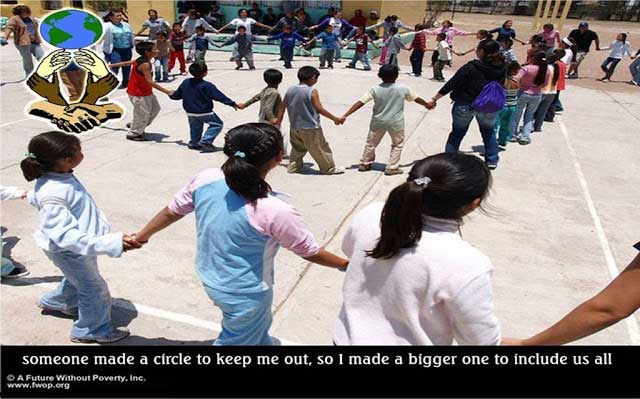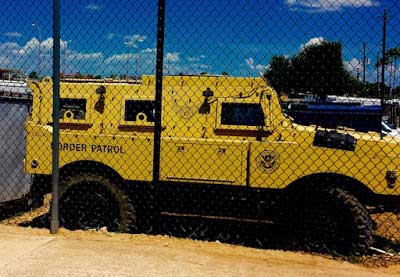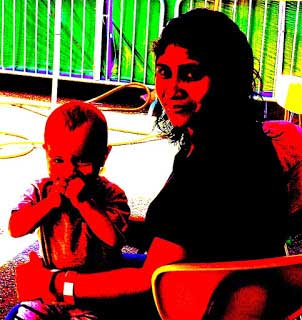I have been too busy in the day-to-day to write anything much these days, but I did want to post my talk at the recent two-day conference presented by Future Without Poverty and dedicated to Reducing Global Poverty Through Grassroots Sustainable Actions.

My husband Andrés L. Pacheco and I have been working with refugee populations at our southern border for the past few years, and we presented some of our findings during one of these excellent sessions. I am hoping to be able to post more in the future, but at least — for now — I can present my own, “The Chronic ‘Refugee Problem’ Under USA’s Rug: Migration Along Our Southern Border.” Andrés informally spoke about our process — what it is we do from beginning to end with the people we come into contact with — while I had a more formal, even if short, talk prepared.
We began to work with refugees when we went to the border to help out in McAllen, Texas, along with people from the entire city and beyond in the state and country, as well as interdenominational organizations who put aside their politics because what we were suffering at the border was a humanitarian crisis.
What we experienced there was that hundreds of thousands of families who sought refuge from the violence, corruption, extreme poverty, and displacement in their home countries — not only in Mexico but also in Central America and across the Atlantic — were being deported without due process.
In the Rio Grande Valley, the surge in unaccompanied children and families has pushed apprehensions at the border to the highest number of every other region on the US-Mexico border. In 2015 alone, there were 147,000 apprehensions, according to the Texas Tribune; this accounted for 44% of the total number and more than double the numbers registered in the next busiest sector in Tucson, Arizona.
What awaits refugees suffering the endless pain and miles of degradation as they journey toward hope, only to arrive at a land that might not welcome them? If we were in their shoes, what might we feel? How would we react?
What can we do to counteract others’ uncivil gestures?
The government states that they “deport only adults and children who have already been ordered removed from the United States by an immigration judge,” but we know this is not so. Many of these families have been subjected to an “expedited removal” without their knowing what is happening; that is, they are ordered removed before they even know it or can speak to any legal party about it. Even more troubling, have probably been denied access to a judge even when they asked for one, in violation of our laws.
These refugees — because they are refugees fleeing for their lives — are now hiding in the shadows, sitting in detention centers awaiting deportation, or being deported as we speak. ALL refugees are subject to expedited removal UNLESS they tell an officer they are afraid — “tengo miedo” — and they are “seeking asylum.”
But they only get to see an officer IF and when they say “tengo miedo”.

© Ana M. Fores Tamayo
Even when they do, however, it is no guarantee that border patrol will send their case to the Department of Homeland Security, since many of them seem to be hard of hearing: hence, most refugees go without a day in court.
El Salvador is the most violent country on earth today, yet less than 6 percent of the Salvadorans arrested by Border Patrol are allowed a “credible fear” interview. This does not make any sense. Most are given deportation papers, sit in detention centers, or are deported. This is a deplorable average: how can it be that fewer than 1 in 50 are given a chance at asylum?
Mexico, Honduras, and Guatemala, along with El Salvador, do not rate any better. What can we do to help these averages?
Since it was too far to travel to McAllen all the time to help out refugees coming in at the border, we decided we had to do something closer to home. Hence, we have been trying to change these deplorable percentages right here in Dallas.
We hold a pro se asylum refugee clinic (pro se means a clinic “without lawyers”), which — with the leadership of Paul Zoltan and in conjunction with Catholic Charities of Dallas — is trying to give monthly workshops to help these refugees fill out their i589 applications asking for asylum. These are for the refugees who have been released either by bond or on their own recognizance, to a relative or parent.
But these are lengthy, complex applications that need to be done in English, so we are in constant need of volunteers to help us.
We need to fill out all the refugees’ biographic information, which can take a long time because their families can be extensive. They also need to state their myriad moves around their home country, trying to avoid violence or whatever problem they were facing; these are also time consuming. More importantly, however, we need to get to the heart of their story: why these refugees are seeking asylum, why they fear returning to their country, why they are afraid for their lives. These are always harrowing accounts, and the tales these families will tell — mostly women and children — are horrific.

© Ana M. Fores Tamayo
But if you are willing to listen and to help, you will find your time well-spent: rewarding and fulfilling.
All our work is done through volunteers.
I am a volunteer 24/7. Paul Zoltan, the lawyer who began this project with a small group of us, maintains the clinic along with Catholic Charities. We have processed at least 130 applications since we began last year, which means that 130 applicants most likely would have been deported, or would be hiding in the shadows, but now they are not.
Though most have still not heard results of a grant of asylum and/or a stay of removal, a few have been granted asylum, though most are still in a waiting process, since the courts are so backed up. At this point in time, they are backlogged about 2 years!
BUT at least this process gives these 130 refugees, and counting, a chance to live freely for some time. And maybe, by the time their court date comes up, the laws will be changed.
We are in desperate need of lawyers, writers, translators, teachers, good samaritans — so if you can offer any assistance — please come talk to us later. We are trying to hold these immigration clinics every month now, so there is always a need for volunteers. More importantly, our idea is to expand these pro se clinics so that they mushroom in cities where refugees go, where they settle, and thus where they are likely to seek help. This is where we can service their needs, help them get started with their asylum applications. If we were to have more pro se asylum clinics in other cities like the one we have here in Dallas, that would be great indeed. But for that, we need to network, we need to cooperate, we need to communicate.
So come get my card. And thank you so very much for listening. If you have any questions, just ask.
Leave a Reply